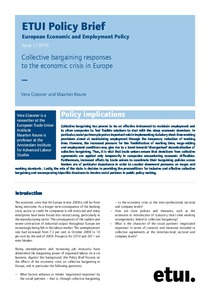Collective bargaining responses to the economic crisis in Europe

Glassner, Vera ; Keune, Maarten
European Trade Union Institute for Research, Education and Health and Safety, Brussels ; European Trade Union Confederation, Brussels
ETUI - Brussels
2010
7 p.
collective bargaining ; economic recession ; collective agreement
ETUI Policy Brief
1
Collective bargaining
English
Bibliogr.
2031-8782
"This Policy Brief provides an overview of collective bargaining responses to the crisis in Europe. It shows clearly that collective bargaining has proven to be an effective instrument to maintain employment and to allow companies to find flexible solutions to deal with the steep economic downturn. They note, though, that the increased pressure for the flexibilisation of working time, wage-setting and employment conditions may give rise to a trend towards ‘disorganised' decentralisation of collective bargaining. Thus, it is vital that trade unions ensure that deviations from collective agreements are applied only temporarily in companies encountering economic difficulties and also that they increase their efforts to coordinate their bargaining policies across borders.
This Policy Brief is based on the Working Paper 'Negotiating the crisis? Collective bargaining in Europe during the economic downturn' (March 2010) written by the authors for the International Labour Office."
Digital
The ETUI is co-funded by the European Union. Views and opinions expressed are however those of the author(s) only and do not necessarily reflect those of the European Union or the ETUI.